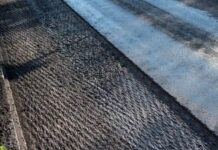A Step-by-Step Guide to asphalt driveway repair for Beauty and Functionality
Over time, even the most well-constructed asphalt driveways will show signs of wear and tear. Cracks, potholes, and fading are common issues that affect both the functionality and appearance of your driveway. Fortunately, with the right approach, asphalt driveway repair can restore your pavement’s aesthetic appeal and ensure its durability for years to come. In this step-by-step guide, we’ll walk you through the process of asphalt driveway repair to help you maintain a beautiful and functional driveway.
At Commonwealth Paving, located at 136 Outerloop, Louisville, Kentucky 40214, we specialize in asphalt driveway repair and maintenance services. If you’re in need of professional assistance, don’t hesitate to reach out to us at +1 502 459 7283. Our team of experts is dedicated to providing high-quality repairs that stand the test of time.
Why Asphalt Driveway Repair is Important
Asphalt driveways are exposed to various elements, including harsh weather conditions, heavy vehicles, and daily wear. Over time, these factors can cause cracks, potholes, and other forms of damage. Addressing these issues promptly with asphalt driveway repair is essential for several reasons:
- Prevents Further Deterioration: Small cracks and holes can quickly expand if left untreated. Asphalt driveway repair prevents minor damage from escalating into larger, more costly problems.
- Enhances Curb Appeal: A well-maintained driveway contributes to the overall aesthetic appeal of your property. Asphalt driveway repair restores the smooth, black finish that enhances the beauty of your home.
- Improves Safety: Cracks and potholes can create tripping hazards and damage vehicles. Timely asphalt driveway repair ensures a safe surface for both pedestrians and vehicles.
- Increases Longevity: Regular maintenance and repair extend the lifespan of your driveway, saving you money on costly replacements.
- Boosts Property Value: A well-maintained driveway adds value to your property and creates a positive first impression for visitors or potential buyers.
Now that we understand the importance of asphalt driveway repair, let’s dive into the step-by-step process to restore your driveway’s beauty and functionality.

Step 1: Assess the Damage
The first step in any asphalt driveway repair project is to thoroughly assess the condition of your driveway. Walk along the surface and take note of the types of damage present, such as:
- Cracks: Cracks are the most common type of damage. They can range from small hairline cracks to larger ones that span the width of the driveway.
- Potholes: Potholes are depressions or holes in the surface caused by the breakdown of asphalt layers. They often occur due to water infiltration and freezing temperatures.
- Fading and Discoloration: Exposure to UV rays and weather conditions can cause asphalt to lose its deep black color and become gray or faded.
- Alligator Cracks: Alligator cracks resemble the scales of an alligator and indicate deeper structural issues in the asphalt.
Identifying the extent and types of damage will help you determine the best repair methods and materials needed for the job.
Step 2: Gather the Necessary Tools and Materials
Once you’ve assessed the damage, it’s time to gather the tools and materials needed for asphalt driveway repair. Depending on the extent of the damage, you may need the following:
- Asphalt Patch or Cold Patch: For filling potholes and large cracks.
- Crack Filler: A liquid or rubberized material used to fill smaller cracks.
- Tampers and Rakes: For leveling and compacting the asphalt patch.
- Sealant or Sealcoat: For resurfacing and protecting the driveway.
- Shovel and Broom: For cleaning debris from cracks and holes.
- Pressure Washer: For cleaning the surface before applying repair materials.
Having the right materials and equipment on hand ensures a smoother and more efficient repair process.
Step 3: Clean the Driveway Surface
Before you begin the asphalt driveway repair, it’s essential to thoroughly clean the surface. Remove any loose debris, dirt, leaves, and weeds from the cracks and holes. Use a broom or leaf blower to clear the area. For stubborn dirt and stains, consider using a pressure washer to achieve a clean surface.
Cleaning is a crucial step because it allows the repair materials to bond properly with the asphalt. Dirt and debris can prevent the patch or filler from adhering correctly, leading to premature failure.
Step 4: Fill Cracks and Small Holes
For small cracks and holes, use a crack filler specifically designed for asphalt. Follow these steps for effective crack repair:
- Apply the Crack Filler: Pour the crack filler directly into the cracks, making sure to slightly overfill them. This allows the filler to settle as it cures.
- Smooth the Filler: Use a putty knife or trowel to smooth the surface of the filler, ensuring that it is level with the surrounding asphalt.
- Allow Time to Cure: Follow the manufacturer’s instructions for curing time. Most crack fillers need at least 24 hours to fully cure before you can apply a sealant or drive over the area.
Crack filling is an essential part of asphalt driveway repair because it prevents water from seeping into the pavement, which can cause further damage during freeze-thaw cycles.
Step 5: Repair Potholes and Larger Cracks
For larger cracks and potholes, you’ll need an asphalt patch or cold patch material. Here’s how to repair these areas:
- Clean the Pothole or Crack: Remove any loose debris, dirt, and broken asphalt from the pothole or crack. You can use a shovel or broom for this task.
- Apply the Asphalt Patch: Pour the asphalt patch material into the pothole or crack. Use a shovel or trowel to spread the patch evenly, slightly overfilling the area.
- Compact the Patch: Use a tamper or the back of a shovel to compact the asphalt patch. Proper compaction is crucial to creating a durable repair that won’t sink over time.
- Level the Surface: After compacting, use a rake or trowel to smooth the surface of the patch so that it’s level with the surrounding driveway.
- Allow Time to Cure: Cold patch materials typically take a few days to fully cure, so avoid driving over the repaired area during this time.
Pothole and crack repair not only improves the appearance of your driveway but also prevents damage from spreading to other areas.
Step 6: Apply a Sealcoat
Sealcoating is a protective layer applied over the surface of your asphalt driveway. It acts as a barrier against water, UV rays, oil spills, and other elements that can damage the asphalt. Applying a sealcoat is the final step in asphalt driveway repair and provides a uniform, black finish.
Follow these steps for sealcoating:
- Choose the Right Sealant: Select a high-quality asphalt sealant designed for residential driveways. Be sure to check the weather forecast and choose a dry day for application.
- Mix the Sealant: Follow the manufacturer’s instructions for mixing the sealant thoroughly. Some sealants require stirring or shaking before use.
- Apply the Sealant: Start by applying the sealant along the edges of the driveway using a brush. Once the edges are covered, pour the sealant onto the surface and use a squeegee or roller to spread it evenly.
- Work in Small Sections: Sealcoat should be applied in small sections to ensure even coverage. Overlap each stroke slightly to prevent streaks and achieve a smooth finish.
- Allow Time to Cure: Most sealants need 24 to 48 hours to dry and cure. During this time, avoid walking or driving on the driveway.
Sealcoating not only enhances the appearance of your driveway but also extends its lifespan by protecting it from the elements.
Step 7: Perform Regular Maintenance
Asphalt driveway repair is an ongoing process. To keep your driveway in top condition, follow these maintenance tips:
- Inspect Regularly: Regularly inspect your driveway for new cracks, potholes, and other signs of damage. Promptly address any issues to prevent them from worsening.
- Sealcoat Every Few Years: Sealcoating should be reapplied every 2 to 3 years to maintain a smooth, protective surface.
- Keep the Driveway Clean: Remove debris, dirt, and leaves from the driveway to prevent stains and damage. Avoid parking heavy vehicles in the same spot for extended periods.
- Watch for Drainage Issues: Proper drainage is essential to prevent water from pooling on the driveway surface. Ensure that gutters and downspouts are directing water away from the driveway.
Asphalt driveway repair is a practical and cost-effective way to maintain the beauty and functionality of your driveway. By following these steps, you can address cracks, potholes, and fading while extending the lifespan of your asphalt pavement. However, for larger or more complex repairs, it’s often best to seek professional help.

At Commonwealth Paving, we specialize in expert asphalt driveway repair services in Louisville, Kentucky, and surrounding areas. Our team is dedicated to delivering high-quality results that enhance your property’s curb appeal and durability. If you’re in need of asphalt driveway repair or maintenance, don’t hesitate to contact us at +1 502 459 7283 or visit our office at 136 Outerloop, Louisville, Kentucky 40214. Let us help you restore your driveway to its former glory with professional care and attention to detail.
DIY vs. Professional Asphalt Driveway Repair: Which Option is Right for You?
When it comes to maintaining your property’s exterior, asphalt driveway repair is often a crucial task. Over time, driveways can develop cracks, potholes, and other forms of damage that not only affect curb appeal but also pose safety risks. If you’re facing the need for asphalt driveway repair, you might be wondering whether to take on the project yourself or hire professional paving contractors. In this guide, we’ll explore the pros and cons of DIY asphalt driveway repair versus hiring professionals, helping you determine the best option for your needs.
Understanding Asphalt Driveway Repair
Asphalt is a popular material for driveways due to its durability, cost-effectiveness, and flexibility in various weather conditions. However, even with these advantages, wear and tear are inevitable. Common issues include surface cracks, sinking areas, and potholes, which can worsen if left unaddressed. Proper asphalt driveway repair involves assessing the damage, preparing the surface, and applying the right materials to restore the driveway’s integrity and appearance.
DIY Asphalt Driveway Repair: The Pros and Cons
Pros of DIY Asphalt Driveway Repair
- Cost Savings: One of the primary reasons homeowners choose to tackle asphalt driveway repair themselves is to save money. By purchasing repair materials and tools, you can potentially reduce the overall cost compared to hiring a professional.
- Flexibility and Convenience: With DIY repair, you have the freedom to work on your own schedule. You don’t need to wait for an appointment or adjust your plans around a contractor’s availability.
- Learning Experience: Taking on a DIY project can be a rewarding experience. You’ll gain knowledge about asphalt repair techniques, learn how to use various tools, and develop problem-solving skills.
- Control Over the Process: You have full control over the project, from choosing materials to deciding how much time to spend on each phase of the repair. This allows you to work at your own pace and ensure every detail meets your standards.
Cons of DIY Asphalt Driveway Repair
- Lack of Expertise: Asphalt driveway repair requires knowledge of the right materials, techniques, and equipment. Without experience, you risk making mistakes that can lead to inadequate repairs or even worsening the damage.
- Time-Consuming: DIY asphalt driveway repair is a time-intensive process. From researching methods and purchasing materials to executing the repair, it can take much longer than expected, especially if you’re unfamiliar with the work.
- Quality of Results: Even with the best intentions, DIY repairs often don’t match the quality of work provided by professional paving companies. Small errors, such as improper filling of cracks or uneven surfaces, can compromise the longevity of your driveway.
- Potential Safety Risks: Working with hot asphalt, heavy equipment, and hazardous chemicals can be dangerous. Without the right safety knowledge and equipment, you could risk injury during the repair process.
Professional Asphalt Driveway Repair: The Pros and Cons
Pros of Professional Asphalt Driveway Repair
- Expertise and Experience: Professional paving companies bring years of experience and specialized knowledge to every job. They know how to assess the condition of your driveway, choose the right materials, and apply them using industry-standard techniques.
- High-Quality Results: Professionals use advanced equipment and proven methods to deliver a durable and smooth surface. With their expertise, they can address underlying issues such as poor drainage, ensuring that your driveway remains in good condition for years to come.
- Time Efficiency: Hiring professionals allows you to complete the project quickly. What might take you several weekends to accomplish can often be done by experts in a day or two, freeing up your time for other priorities.
- Long-Term Cost Savings: While hiring a professional may seem more expensive upfront, it can save you money in the long run. A high-quality repair job is less likely to require additional fixes down the road, reducing the overall maintenance costs.
- Safety and Compliance: Paving companies follow safety regulations and best practices, minimizing the risk of accidents during the repair process. Additionally, they are familiar with local codes and standards, ensuring that your driveway meets all necessary requirements.
Cons of Professional Asphalt Driveway Repair
- Higher Initial Costs: The most significant downside of hiring professionals is the upfront cost. Professional services typically involve labor, equipment, and premium materials, which can be more expensive than a DIY approach.
- Scheduling Constraints: You’ll need to work around the contractor’s availability, which might mean waiting for an appointment or coordinating with their timeline.
- Less Control Over the Process: When you hire a professional, you’re trusting someone else to manage the project. While this usually results in better quality, you may have less input on specific details compared to a DIY job.

Comparing Costs: DIY vs. Professional Asphalt Driveway Repair
When evaluating costs, consider both the short-term and long-term expenses. For DIY repairs, you’ll need to account for the cost of materials, tools, and potentially renting equipment. Even though this may seem more affordable, it’s essential to consider the risk of subpar results that could require future repairs. On the other hand, professional services come with a higher upfront cost but typically result in more durable and lasting repairs, which can be more cost-effective in the long run.
For example, a small DIY asphalt repair kit might cost between $50 to $200, depending on the extent of the damage. Renting equipment like a plate compactor or asphalt heater could add another $100 to $300. In contrast, professional services for asphalt driveway repair can range from $500 to $3,000, depending on the size of the driveway and the extent of repairs needed.
How to Decide: DIY or Professional Asphalt Driveway Repair?
Your decision should be based on several factors:
- Budget: If you’re working with a tight budget and the damage is minimal, a DIY approach might be viable. However, for extensive damage or large driveways, investing in professional repair could be more economical over time.
- Experience and Skill Level: Consider whether you have the skills, tools, and time to handle the repair properly. If you’re confident in your abilities and enjoy hands-on projects, DIY might be a good choice. Otherwise, professional services ensure a higher-quality outcome.
- Time Constraints: If you need the repair completed quickly, hiring professionals is likely the best option. DIY repairs can drag on, especially if you’re balancing work and other commitments.
- Severity of Damage: Minor cracks or surface-level issues can often be fixed with a DIY approach. However, if your driveway has deep cracks, drainage problems, or structural issues, a professional is the better option to avoid future complications.
Why Choose Commonwealth Paving for Your Asphalt Driveway Repair?
If you decide that professional asphalt driveway repair is the right choice, working with a trusted company is essential. Commonwealth Paving, located at 136 Outerloop, Louisville, Kentucky 40214, specializes in delivering top-notch paving services. Our experienced team ensures that every repair is done with the highest level of craftsmanship and attention to detail. Whether your driveway needs minor patchwork or a complete resurfacing, we provide efficient and reliable solutions.
For more information or to schedule a consultation, contact Commonwealth Paving at +1 502 459 7283. Let our professionals handle your asphalt driveway repair needs, so you can enjoy a smooth, durable, and beautiful driveway that enhances your property’s curb appeal.
When it comes to asphalt driveway repair, both DIY and professional options have their benefits and drawbacks. While DIY repairs can be cost-effective and convenient for small issues, professional services offer expertise, quality, and long-term value, especially for larger or more complex repairs. Evaluate your specific needs, budget, and skill level to determine the best route for your driveway. If you’re leaning toward professional services, Commonwealth Paving is here to provide expert guidance and high-quality results that stand the test of time.
Address
Commonwealth Paving, 136 Outerloop, Louisville, Kentucky 40214
Phone: 502-459-7283, Fax: 502-456-2678
Opening Hours
| Monday | 9:00 AM – 5:00 PM |
| Tuesday | 9:00 AM – 5:00 PM |
| Wednesday | 9:00 AM – 5:00 PM |
| Thursday | 9:00 AM – 5:00 PM |
| Friday | 9:00 AM – 5:00 PM |
| Saturday | Closed |
| Sunday | Closed |






